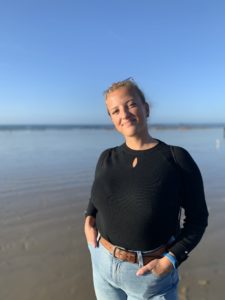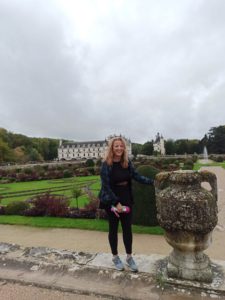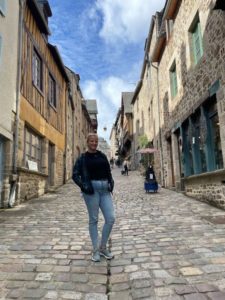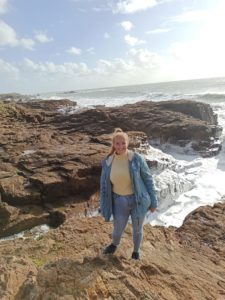Alexandra Ens

1. Why do you think a semester abroad is crucial to your master’s study?
I think a semester abroad is an important experience for anyone, but especially crucial for SDAC students to apply the theoretical knowledge in a new environment. Apart from the possibility to learn a new language, it also enables students to collect valuable experience that will shape their understanding of culture(s).
2. Where did you go for your semester abroad?
I went to Angers, in France, which is a small town about the same size as Erlangen. I studied at ESSCA, which stands for École supérieure des sciences commerciales d’Angers. It’s a private business school that has a very good reputation in France.
3. How did you find out about the study place in Angers and how was the application process?
Initially, we were supposed to go to Beijing during the 3rd semester. However, this was unfortunately not possible, as COVID restrictions in China did not allow any students to enter the country. Therefore, the SDAC was looking for other opportunities to let the students go abroad. The M.A Development Economics and International Studies (MADEIS) study program kindly offered us to apply for the places at their partner universities. Concludingly, I was able to have an exchange semester in the 5th semester and I am really grateful to have received this chance, as it was an amazing experience. The application process went very smoothly. The responsible professors of the MADEIS study program as well as coordinator of ESSCA were very patient, answered all questions and were very helpful when I needed help to fill out documents, such as the learning agreement and the grant agreement, and to get an accommodation in the student dormitory.
4. How did you finance your semester abroad?
I financed the semester abroad with the help of the ERASMUS+ scholarship, the Germany scholarship and a student job at FAU, where I could continue to work remotely. Regarding the Erasmus scholarship it was even possible to receive a top up, if for example both parents are not academics or if the student has a handicap. In general, I think ERASMUS is a great opportunity for anyone to finance one´s stay abroad, and even though there are many documents to fill out the application process is quite easy. When I had questions or problems regarding the documents or deadlines, the mobility team always responded quickly which was very helpful.

5. What classes did you choose at the university? And why?
I took courses in “Strategy”, “Leadership” and “Finance Management”, which belong to the first year of the Master’s program in Management. I chose the leadership course, because I was curious to learn about leadership theories and best practice examples. Moreover, I wanted to learn what tools companies can use to define their business strategy and how they implement them. Last but not least, finance management is an essential part of business that any manager should have a basic understanding of. This is a great combination for students to receive a basic understanding of what companies have to deal with on a management level.
I gratefully took this opportunity to refresh my language skills at the beginning of the semester to be able to communicate with my fellow classmates in their native language and get along in my daily life, because English as a second language is not commonly spoken in France.
6. How did you like France, especially Angers?
I really enjoyed life there. Even though it is a small city, the atmosphere is very lively. Every evening students meet in the city center to have a drink or play games in cafes that offer many different board or card games. Thus, I could easily find friends with whom I could practice my French, eat good food or do sports together.

7. What were you doing in your free time?
At the beginning of the semester, I enjoyed travelling to nearby cities. Especially, those close to the sea were my favorite destinations. As the temperature dropped towards the end of the year, I preferred staying in Angers and hanging out with my friends. Moreover, I did lots of sports, as the student dormitory and the University offer a small gym that can be used free of charge.
8. Did you attend any extracurricular activities?
Within ESSCA I did not attend many extracurricular activities, even though there were plenty of events such as a Gala or a farewell party. However, there was a neighborhood association in the area where I lived, which organized some interesting events for international students. There I joined some events, such as a visit to a slate mine museum or arts gallery to learn about the history and culture of the region.
9. What were your impressions of the student community and life at the university in general?
University life in Germany and France is different, but I cannot say that one is better than the other. For example, while seminars are held with different participants in German universities, at ESSCA the same fellow students always attended the seminars. Therefore, it was possible to build closer relationships with classmates as we spent more time together. However, this meant that getting to know students who were not in the courses was a bit more difficult. What I definitely disliked in France, was the fact that there is no fixed timetable, meaning that classes change on a weekly basis, and one needs to check the schedule daily, as changes can occur at any time. This was very annoying as it made planning the week very difficult.

10. Based on your experience, would you recommend such a semester abroad to other students?
I can definitely recommend to anyone to get the experience of studying a semester abroad, especially to those who are curious to get to know new people and learn another language. The best way to learn a new language is by using it on a daily basis. Moreover, you will get to know new ways of life, make friends with people from all around the world and develop your own personality by getting out of your comfort zone.
